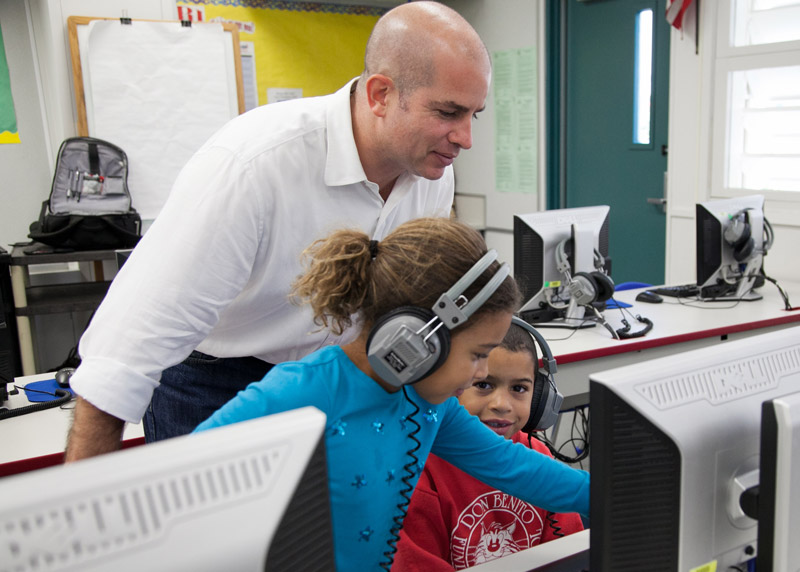Rethinking Mentoring

Adam Aberman ’94 insists that conducting research deep in the rainforests of Panama helped to make him a freethinker. While participating in Vassar’s Anthropological Research Experience, he tested the theory that more money could be earned per tropical rainforest acre by extracting and selling medicinal plants than by cutting down the forests and creating mono-crop farms.
In Panama, he eventually realized “it was problematic for someone like me to spend a few months in another country and make serious suggestions about how someone else should change their lives and their economies.” But that ability to rethink outmoded systems would come in handy later as he addressed problems in America’s faltering education system.
When he returned to the States, Aberman took a job working at Charles Schwab by day and volunteered at an education nonprofit at night. “I began to think of education as a way to deal with the causes of things, not the symptoms,” he says. He did a two-year stint as a bilingual elementary school teacher in Los Angeles to get some practical experience before attending graduate school.
At Harvard University’s John F. Kennedy School of Government he earned a master’s degree in public policy with a focus on education. His master’s thesis involved developing a five-year strategic plan for one of the early charter schools in Massachusetts. He also took classes on educational law and on starting new business ventures. (“I had no idea how much that course would benefit me a year later,” he says of the latter.)
After graduating, he went to work for the New York City Board of Education in the Office of School Planning and Accountability. In speaking to guidance counselors, he found that in large public high schools the counselors can have caseloads of 1,000 or 2,000 kids. “No matter what your profession, if you’re the only one responsible for that many clients, you’re probably not going to provide a very good service,” he reasons. His research revealed that there were about 15 million kids in the country at any given time that needed mentoring and didn’t have access to it.
A light bulb went off.
Back then, in 2000, the Internet was just becoming popular, and the notion that people could use it to deliver services was gaining traction. That year, he created iCouldBe.org, an e-mentoring, career development, and college guidance service for teens. Its mission is “to provide at-risk middle and high school students with an online community of professional mentors, empowering teens to stay in school, plan for future careers, and achieve in life.”
“Low-income kids can have a very limited understanding of what the possibilities are,” says Aberman. Digital mentoring, he says, helps to expand their vision, to uncover the many things they could do based on their interests.
So far, about 20,000 kids and 10,000 e-volunteers have taken advantage of the service. When he first launched the website, he had about 500 e-volunteers—primarily Vassar and Harvard contacts. (One of the organization’s founding board members was his classmate Jonah Levey ’94). Today, they mostly come from volunteer websites and corporate partners like AT&T and Thomson Reuters.
The organization reaches teens through their schools or after-school programs. Students fill out interest surveys in order to be matched with potential mentors. “Kids choose the mentors with whom they want to work over the course of a year,” says Aberman. “They complete structured activities together online but never actually meet in person. A kid in New York, for example, could have multiple mentors in Chicago, Texas, and California.” Eventually, the mentors help students plan their academic and career goals.
After going through the process, students sometimes end up with a different career goal than they initially had. One such 16-year-old, Marilyn, was the first person in her family to be born in the U.S., and now she hopes to be the first person to attend college. When she initially logged onto the site, she looked for mentors in medical technology but found she had very little to say once she connected with a volunteer in that field. She decided to try another search. After she submitted her interest form, iCouldBe.org returned an unexpected suggestion for a mentor: a stockbroker. Marilyn perked up and emailed her a volley of questions right away. “The dialogue just went on and on,” Marilyn says. “I began to daydream about the world of a stockbroker and I was playing the main character.” She now knows that in order to become a stockbroker, she needs to do well in high school and study finance in college. “The encouragement I receive from the mentor helps me to stay motivated and to keep working toward my goal.”
Aberman ran iCouldBe.org for six years but admits that during the first two years he was “definitely bootstrapping it.” He started a consulting company to earn extra money, but the practice developed a life of its own, and he left iCouldbe.org in the hands of its current staff. He is now CEO of the Learning Collective, which plans, implements, and evaluates digital and analog learning initiatives. A significant amount of the Learning Collective’s work involves evaluating existing charter schools as well as proposals for new ones, especially those that plan to use plenty of technology in their curriculum.
